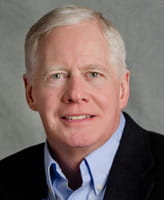Rob Dintruff is a faculty member in the Kellogg School of Management at Northwestern University and a Board Member of the Northwestern Global Health Foundation. He lectures on Global Health and provides assistance to the Foundation's projects that are developing diagnostic products that better suit the unique needs of resource-limited settings. Prior to this role, Rob was employed by Abbott Laboratories and AbbVie, as the Commercial Development Director for Virology in Abbott's International Division. His career with Abbott and AbbVie spanned 34 years since the completion of his graduate work at the University of Michigan. His assignments have included various production, sales, business development and marketing management positions in both the Diagnostics Division and the International Division.
In a previous position with Abbott that began in 2000, Rob was the Director for Global Care Initiatives where he established and managed the Abbott Access and Determine HIV Testing Donation programs and helped develop Abbott's Step Forward program, an initiative that assists children orphaned by HIV and AIDS in developing nations.
Under the Abbott Access program the antiretroviral drugs developed and marketed by Abbott were provided, at no profit, as part of a second-line therapy to treat people living with HIV/AIDS in Africa and Least Developed Countries. Included in Abbott's offering was the rapid test Determine HIV,also provided at no profit.
The Determine HIV Donation Program provided Abbott's rapid HIV antibody test free of charge in Africa and Least Developed Countries where the product was used to test pregnant women in programs that prevent mother-to-child transmission of HIV.
Rob has traveled extensively in Africa, Asia, Latin America and Europe. He has worked in cooperation with various stakeholders including the World Health Organization, UNAIDS, the International AIDS Society, World Bank, Global Fund for AIDS, TB and Malaria, the U.S. President's Emergency Plan for AIDS Relief, various patient advocacy organizations, and NGOs as well as other companies and governmental organizations engaged in HIV care and treatment.


